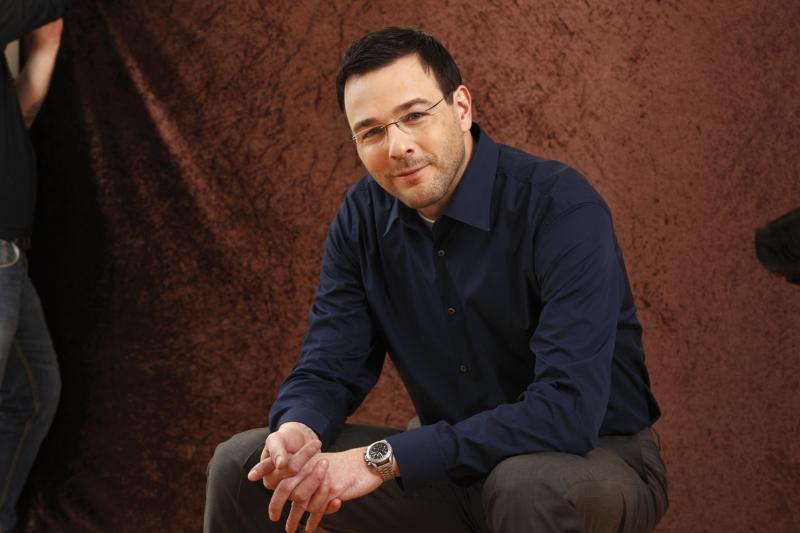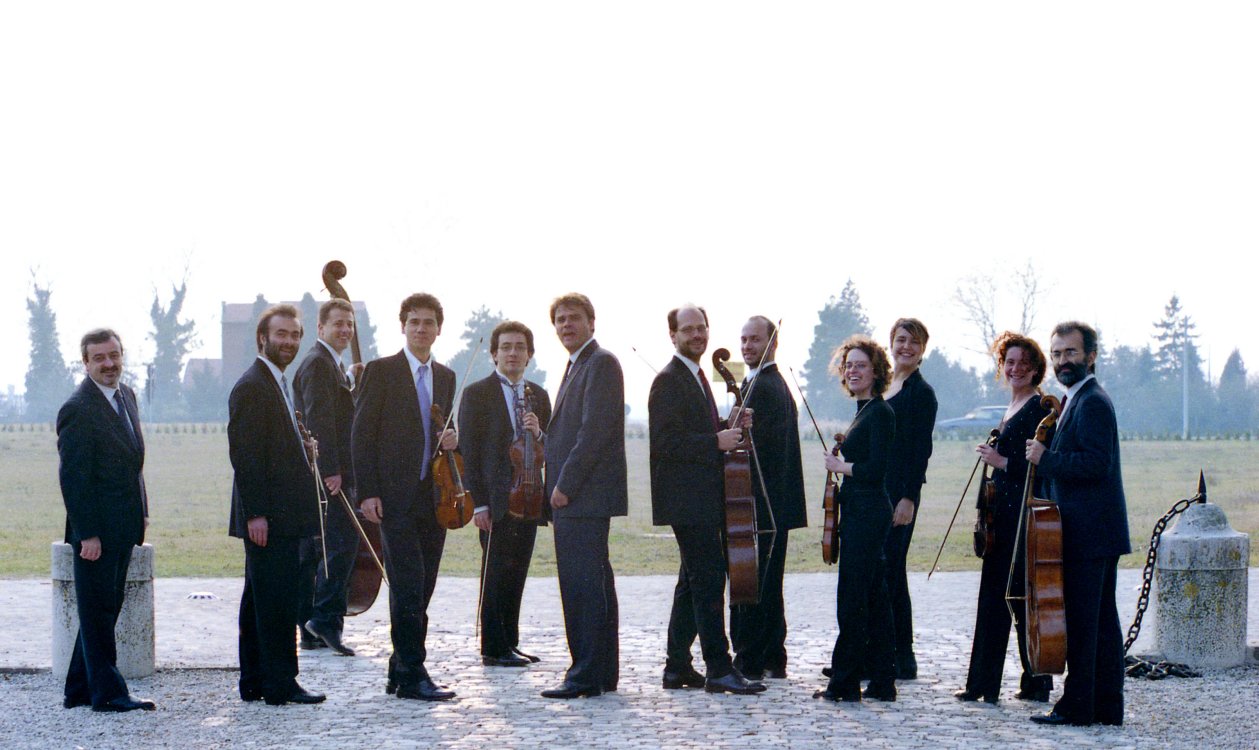Andreas Scholl, Accademia Bizantina, Barbican | reviews, news & interviews
Andreas Scholl, Accademia Bizantina, Barbican
Andreas Scholl, Accademia Bizantina, Barbican
Newly discovered works got a bit lost in the fuss and fog of this performance

Marian devotions have given us some of sacred music’s most striking works, from graceful Ave Marias to anguished settings of the Stabat Mater. Andreas Scholl and musicologist Bernardo Ticci have recently gone in search of some less familiar ones – companion pieces for Vivaldi’s theatrical Stabat Mater, which has long been part of Scholl’s concert repertoire.
While the speaker of the Stabat Mater (set here both by Vivaldi) watches the grieving Virgin from a distance, the Marian texts of Porpora’s Il trionfo della Divina Giustizia nei tormenti e morte di Gesu Cristo and Vinci’s Oratorio a 4 Voci e Stromenti are both first-person narratives, creating a wonderfully androgynous friction with a countertenor soloist. It’s a dramatic tension Scholl’s distinctive voice plays into, its glassy purity – frosted slightly now compared to its early clarity – chafing against the low-lying register of much of this repertoire.
Scholl delivered a disquietingly beautiful performance of Vivaldi's 'Stabat Mater'There’s an aural discomfort that works nicely for the Porpora, with its knottier emotions and aching lament “Occhi mesti”, but less so for the galant ease and trickling lyricism of the Anfossi or the showy coloratura of Porpora’s “Per pieta”, which would both benefit from a power and gloss Scholl simply doesn’t have towards the lower end of his voice. Had the concert been programmed in the Wigmore Hall it wouldn’t have mattered so much, but in the unsympathetic cavern of the Barbican it was unignorable, and I wonder how much those at the back were really able to hear.
But with the Vivaldi the mist lifted. Released into a more comfortable register Scholl delivered a disquietingly beautiful performance, taking us from the dark drama of his “Quis est homo”, its string parts hammering the nails of the Cross so clearly, to the rhetorical fluidity of the “Quis non posset” and the fragility of the “Vidit suum” passage. How good to hear the work among its peers, to set it against the passionate, quasi-operatic spirituality of the Porpora and Vinci and the superficial, salon charm of the Anfossi, and understand the power of its restraint.
 Under music director Ottavio Dantone Accademia Bizantina (pictured above) are a dynamic force. Without him, directed from the violin by Alessandro Tampieri, the Ravenna-based group were noticeably more muted, less expansive in their gestures. Ragazzi’s Sonata a 4 in C minor was engaging enough, if unremarkable, but Vivaldi’s Violin Concerto in G minor RV332 felt decidedly unsteady, pinched and anxious from Tampieri as soloist – a feeling transmitted to the band whose tempi rocked unsettlingly throughout.
Under music director Ottavio Dantone Accademia Bizantina (pictured above) are a dynamic force. Without him, directed from the violin by Alessandro Tampieri, the Ravenna-based group were noticeably more muted, less expansive in their gestures. Ragazzi’s Sonata a 4 in C minor was engaging enough, if unremarkable, but Vivaldi’s Violin Concerto in G minor RV332 felt decidedly unsteady, pinched and anxious from Tampieri as soloist – a feeling transmitted to the band whose tempi rocked unsettlingly throughout.
Too many tuning breaks and too much stage business cluttered a programme with much to offer, blunting the dramatic blade of works that deserved greater clarity for what was, in many cases, their first concert outing in the UK.
Add comment
The future of Arts Journalism
You can stop theartsdesk.com closing!
We urgently need financing to survive. Our fundraising drive has thus far raised £49,000 but we need to reach £100,000 or we will be forced to close. Please contribute here: https://gofund.me/c3f6033d
And if you can forward this information to anyone who might assist, we’d be grateful.

Subscribe to theartsdesk.com
Thank you for continuing to read our work on theartsdesk.com. For unlimited access to every article in its entirety, including our archive of more than 15,000 pieces, we're asking for £5 per month or £40 per year. We feel it's a very good deal, and hope you do too.
To take a subscription now simply click here.
And if you're looking for that extra gift for a friend or family member, why not treat them to a theartsdesk.com gift subscription?
more Classical music
 Bizet in 150th anniversary year: rich and rare French offerings from Palazzetto Bru Zane
Specialists in French romantic music unveil a treasure trove both live and on disc
Bizet in 150th anniversary year: rich and rare French offerings from Palazzetto Bru Zane
Specialists in French romantic music unveil a treasure trove both live and on disc
 Scottish Chamber Orchestra, Ibragimova, Queen’s Hall, Edinburgh review - rarities, novelties and drumrolls
A pity the SCO didn't pick a better showcase for a shining guest artist
Scottish Chamber Orchestra, Ibragimova, Queen’s Hall, Edinburgh review - rarities, novelties and drumrolls
A pity the SCO didn't pick a better showcase for a shining guest artist
 Kilsby, Parkes, Sinfonia of London, Wilson, Barbican review - string things zing and sing in expert hands
British masterpieces for strings plus other-worldly tenor and horn - and a muscular rarity
Kilsby, Parkes, Sinfonia of London, Wilson, Barbican review - string things zing and sing in expert hands
British masterpieces for strings plus other-worldly tenor and horn - and a muscular rarity
 From Historical to Hip-Hop, Classically Black Music Festival, Kings Place review - a cluster of impressive stars for the future
From quasi-Mozartian elegance to the gritty humour of a kitchen inspection
From Historical to Hip-Hop, Classically Black Music Festival, Kings Place review - a cluster of impressive stars for the future
From quasi-Mozartian elegance to the gritty humour of a kitchen inspection
 Shibe, LSO, Adès, Barbican review - gaudy and glorious new music alongside serene Sibelius
Adès’s passion makes persuasive case for the music he loves, both new and old
Shibe, LSO, Adès, Barbican review - gaudy and glorious new music alongside serene Sibelius
Adès’s passion makes persuasive case for the music he loves, both new and old
 Anja Mittermüller, Richard Fu, Wigmore Hall review - a glorious hall debut
The Austrian mezzo shines - at the age of 22
Anja Mittermüller, Richard Fu, Wigmore Hall review - a glorious hall debut
The Austrian mezzo shines - at the age of 22
 First Person: clarinettist Oliver Pashley on the new horizons of The Hermes Experiment's latest album
Compositions by members of this unusual quartet feature for the first time
First Person: clarinettist Oliver Pashley on the new horizons of The Hermes Experiment's latest album
Compositions by members of this unusual quartet feature for the first time
 Gesualdo Passione, Les Arts Florissants, Amala Dior Company, Barbican review - inspired collaboration excavates the music's humanity
At times it was like watching an anarchic religious procession
Gesualdo Passione, Les Arts Florissants, Amala Dior Company, Barbican review - inspired collaboration excavates the music's humanity
At times it was like watching an anarchic religious procession
 Classical CDs: Camels, concrete and cabaret
An influential American composer's 90th birthday box, plus British piano concertos and a father-and-son duo
Classical CDs: Camels, concrete and cabaret
An influential American composer's 90th birthday box, plus British piano concertos and a father-and-son duo
 Cockerham, Manchester Camerata, Sheen, Martin Harris Centre, Manchester review - re-enacting the dawn of modernism
Two UK premieres added to three miniatures from a seminal event of January 1914
Cockerham, Manchester Camerata, Sheen, Martin Harris Centre, Manchester review - re-enacting the dawn of modernism
Two UK premieres added to three miniatures from a seminal event of January 1914
 Kempf, Brno Philharmonic, Davies, Bridgewater Hall, Manchester review - European tradition meets American jazz
Bouncing Czechs enjoy their Gershwin and Brubeck alongside Janáček and Dvořák
Kempf, Brno Philharmonic, Davies, Bridgewater Hall, Manchester review - European tradition meets American jazz
Bouncing Czechs enjoy their Gershwin and Brubeck alongside Janáček and Dvořák
 Solomon, OAE, Butt, QEH review - daft Biblical whitewashing with great choruses
Even a top soprano and mezzo can’t make this Handel paean wholly convincing
Solomon, OAE, Butt, QEH review - daft Biblical whitewashing with great choruses
Even a top soprano and mezzo can’t make this Handel paean wholly convincing

Comments
Many thanks for this review.
Many thanks for this review. Just a few corrections. Mrs Coughlan writes, "While the speaker of the Stabat Mater (set here both by Vivaldi and Anfossi)". There was no "Stabat Mater" by Anfossi performed in the program. The Anfossi piece we performed was a "Salve Regina", which is from it´s content something altogether different. There is no "Vidit suum" movement in Vivaldi´s "Stabat Mater" as Mrs. Coughlan suggests. This stanza is included as a soprano aria in Pergolesis "Stabat Mater", but isn´t featured as a separate movement in Vivaldis "Stabat Mater". Leonardo Vincis two arias were also performed during the concert as advertised in the program brochure. I agree on Mrs. Coughlan´s important observation about the "stage business" breaking up the arch of musical tension. As she would agree: There is always space for improvement.
Thank you for your correction
Thank you for your correction, Andreas. The reference to the Anfossi has been changed, and I have made it clear that the reference to the "Vidit suum" is the passage of music rather than a discrete movement.
That´s the beauty of being a
If all facts are to be
You're comparing apples with
Dear "Andrew" (if that really
Your analogy is also rather
If music critics can't get
For me, the stand-out pieces